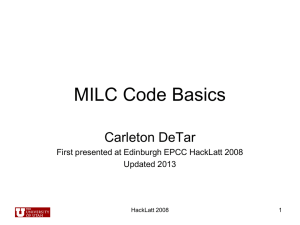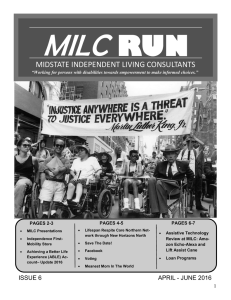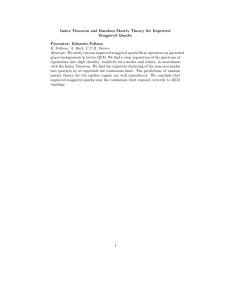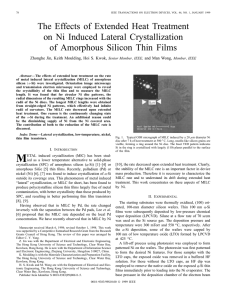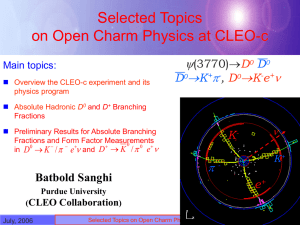Charm physics with Highly Improved Staggered Quarks
advertisement
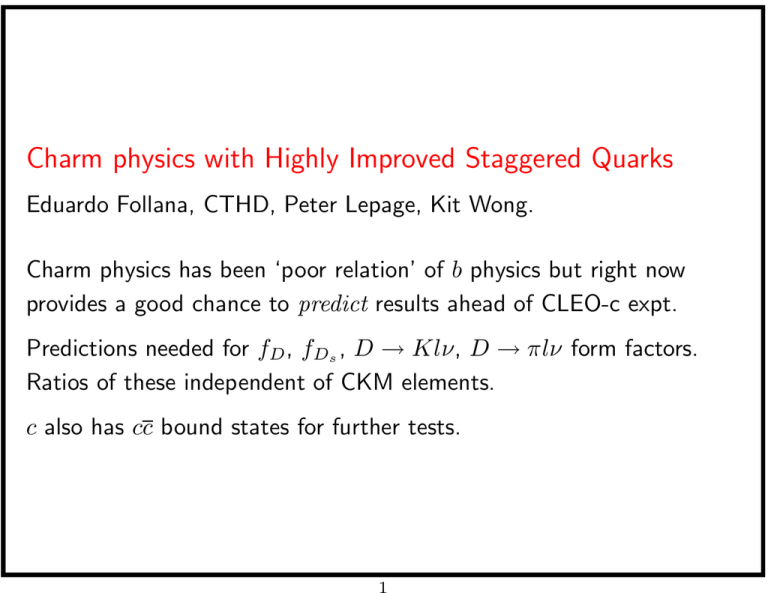
Charm physics with Highly Improved Staggered Quarks Eduardo Follana, CTHD, Peter Lepage, Kit Wong. Charm physics has been ‘poor relation’ of b physics but right now provides a good chance to predict results ahead of CLEO-c expt. Predictions needed for fD , fDs , D → Klν, D → πlν form factors. Ratios of these independent of CKM elements. c also has cc bound states for further tests. Current Status • Best results from FNAL/MILC. Use FNAL action on MILC ensembles at 3 a values (but most coarse and supercoarse since slow). Action has O(αs a) and O(a2 ) errors in principle. Some reduction using non-rel. interpretn and ratios of corrln fns. Errors in fD etc quoted at around 10%. Don’t do a great job on cc e.g. fix c from Ds instead of ψ. • Also have results (I. Allison) using NRQCD on MILC coarse and supercoarse. Limit to accuracy is pert. matching since αs large when mc a > 0.7. Current Status - decay constants 1.40 a = 0.121 fm staggered χPT fit (to 60 points) taste violations removed mq = ml CLEO-c LP05 s 1.20 s 1/2 fD mD /fDmD 1/2 1.30 1.10 FNAL/MILC/HPQCD 1.00 0.0 0.2 0.4 0.6 mq/ms 0.8 1.0 1.2 100 150 200 250 fD (MeV) 300 Both exptl and theory errors 8% in fD from 2005. Ratio fDs /fD quoted at 1.24(7) by FNAL (hep-lat/0506030). SL form factors 2 2 qmax/mD* s 2.5 D → Klν 1.5 2 f+(q )/f+(0) 2 1 experiment [FOCUS, hep-ex/0410037] lattice QCD [Fermilab/MILC, hep-ph/0408306] 1σ (statistical) 2σ (statistical) 0.5 0 0 0.05 0.1 0.15 0.2 0.25 2 /mD* s 2 q 0.3 0.35 0.4 0.45 Comparison to FOCUS here. New results on D → K and D → π expected over next year from CLEO-c. Ratios independent of CKM with decay constants. Quark masses Quark masses (MeV) 2005 lattice QCD 2004 PDG 10000 b c 1000 s 100 10 d u 1 mc (mc ) = 1.10(13) GeV (Nobes, Trottier, LAT05) One-loop matching. Relativistic charm Conclusion: we need a better (and faster) c quark action. How improved must this be for few % errors? With mc a ≈ 0.33, (mc a)2 ≈ 0.1, αs (mc a)2 ≈ 0.02. → an action with tree-level a2 errors removed will have few % errors at a ≈ 0.06fm. There is only one such action in use : improved staggered. Have developed Highly Improved Staggered (HISQ) action that has smaller taste-changing than asqtad. Also very fast. Test this on MILC fine lattices. Simplest to test this on cc and provides worst case scenario on syst. errors. cc pseudoscalar and vector ’ηc’ masses, fine, ma=0.43 3.2 space-split pion time-split pion rho expt mass /GeV 3.15 3.1 local ψ 3.05 3 2.95 3 link taste-s 1 link goldstone 2 link Stat. errors tiny. 16 ηc and ψ. Taste-splittings not visible (¡ 2 MeV) for ψ. 10 MeV total for ηc . This is as expected since taste-split at fixed a ∝ 1/M . Speed of light 2 c , fine, ma=0.43, coarse, ma=0.65 2 fine goldstone coarse goldstone c 2 1.5 1 0.5 0 0 0.5 1 1.5 2 2 p 2.5 3 3.5 4 c2 is ratio of E 2 to p2 term in dispn reln. i.e. mkin /m = 1/c2 . Find c2 = 1.02(2) on fine MILC, 1.15(2) on coarse MILC. Tree-level analysis gives 9/20(ma)4 , pert. analysis gives < 0.1αs (ma)2 in agreement with this. Tree-level a2 errors give 20% error even on fine. Error budget for charm mass using HISQ and ψ Fine Superfine Errors in a 0% Speed of light 2% 0% <1% p4 /8m3 errors 1.5% <1% αs3 errors 3% 2% 4% 2% in matching Total Good check is 2mDl/s − mψ . Need high β MC for mass renormln. Looks do-able. Hyperfine splitting very sensitive to systematic errors. hyp vs asq for hisq inc. syst errors fine coarse fnal expt 140 Prop. to inverse kinetic mass, so must use this if c2 6= 1. a error appears twice, because of this inverse reln. FNAL results have ambiguity (at least for coarse) whether fix c from HH or HL. hyp/MeV 120 100 80 60 0 0.005 0.01 2 a (fm) 0.015 2 0.02 Matrix elements fD /fDs and ψ leptonic width in progress on fine MILC. Can be done with conserved currents so no renormalisation. Leaves at worst αs (ma)2 errors for fD and fDs = 5% on fine, 2% on superfine. Ratio more accurate. Conclusions We can get 3% errors for charm on superfine lattices using Highly Improved Staggered Quarks. Not possible with any other existing method.
